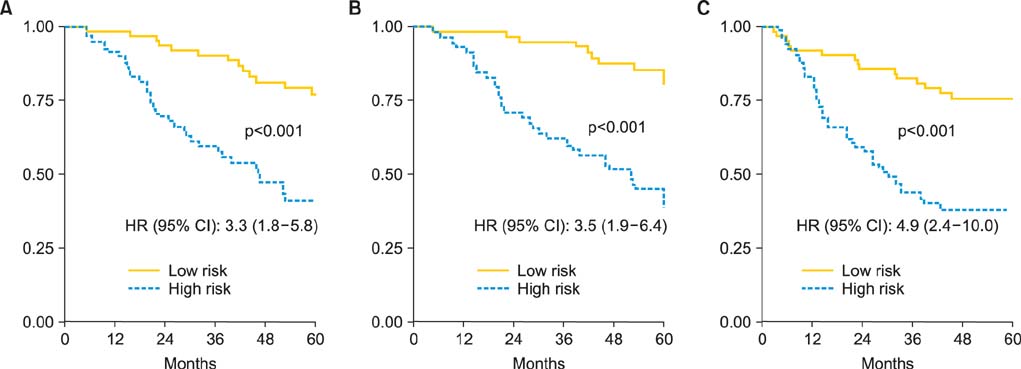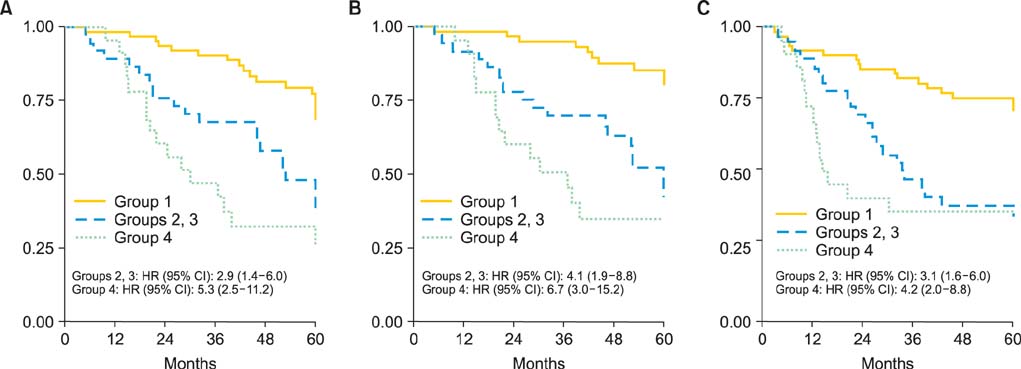J Gynecol Oncol.
2014 Oct;25(4):313-319. 10.3802/jgo.2014.25.4.313.
The survival outcome and patterns of failure in node positive endometrial cancer patients treated with surgery and adjuvant radiotherapy with curative intent
- Affiliations
-
- 1Peter MacCallum Cancer Centre and University of Melbourne, East Melbourne, VIC, Australia. rchrishanthi@hotmail.com
- 2Division of Radiation Oncology, Peter MacCallum Cancer Centre, East Melbourne, Victoria, Australia.
- 3Rural Clinical School, University of Queensland, Toowoomba, Queensland, Australia.
- KMID: 2130120
- DOI: http://doi.org/10.3802/jgo.2014.25.4.313
Abstract
OBJECTIVE
The purpose of this study was to evaluate the patterns of failure, overall survival (OS), disease-free survival (DFS) and factors influencing outcome in endometrial cancer patients who presented with metastatic lymph nodes and were treated with curative intent.
METHODS
One hundred and twenty-six patients treated between January 1996 to December 2008 with surgery and adjuvant radiotherapy were identified from our service's prospective database. Radiotherapy consisted of 45 Gy in 1.8 Gy fractions to the whole pelvis. The involved nodal sites were boosted to a total dose of 50.4 to 54 Gy.
RESULTS
The 5-year OS rate was 61% and the 5-year DFS rate was 59%. Grade 3 endometrioid, serous, and clear cell histologies and involvement of upper para-aortic nodes had lower OS and DFS. The number of positive nodes did not influence survival. Among the histological groups, serous histology had the worst survival. Among the 54 patients relapsed, only three (6%) failed exclusively in the pelvis and the rest of the 94% failed in extrapelvic nodal or distant sites. Patients with grade 3 endometrioid, serous and clear cell histologies did not influence pelvic failure but had significant extrapelvic failures (p<0.001).
CONCLUSION
Majority of node positive endometrial cancer patients fail at extrapelvic sites. The most important factors influencing survival and extrapelvic failure are grade 3 endometrioid, clear cell and serous histologies and involvement of upper para-aortic nodes.
MeSH Terms
-
Adenocarcinoma, Clear Cell/pathology/radiotherapy/*secondary/surgery
Adult
Aged
Aged, 80 and over
Carcinoma, Endometrioid/pathology/radiotherapy/*secondary/surgery
Cystadenocarcinoma, Papillary/pathology/radiotherapy/*secondary/surgery
Endometrial Neoplasms/pathology/radiotherapy/*surgery
Female
Humans
Lymphatic Metastasis
Middle Aged
Neoplasm Staging
Prognosis
Prospective Studies
Radiotherapy, Adjuvant
Salvage Therapy/methods
Survival Analysis
Treatment Failure
Treatment Outcome
Figure
Reference
-
1. Wolfson AH, Sightler SE, Markoe AM, Schwade JG, Averette HE, Ganjei P, et al. The prognostic significance of surgical staging for carcinoma of the endometrium. Gynecol Oncol. 1992; 45:142–146.2. Narayan K, Khaw P, Bernshaw D, Mileshkin L, Kondalsamy-Chennakesavan S. Prognostic significance of lymphovascular space invasion and nodal involvement in intermediate- and high-risk endometrial cancer patients treated with curative intent using surgery and adjuvant radiotherapy. Int J Gynecol Cancer. 2012; 22:260–266.3. Lee LJ, Viswanathan AN. Combined chemotherapy and radiation improves survival for node-positive endometrial cancer. Gynecol Oncol. 2012; 127:32–37.4. Klopp AH, Jhingran A, Ramondetta L, Lu K, Gershenson DM, Eifel PJ. Node-positive adenocarcinoma of the endometrium: outcome and patterns of recurrence with and without external beam irradiation. Gynecol Oncol. 2009; 115:6–11.5. Patel S, Portelance L, Gilbert L, Tan L, Stanimir G, Duclos M, et al. Analysis of prognostic factors and patterns of recurrence in patients with pathologic stage III endometrial cancer. Int J Radiat Oncol Biol Phys. 2007; 68:1438–1445.6. McMeekin DS, Lashbrook D, Gold M, Johnson G, Walker JL, Mannel R. Analysis of FIGO Stage IIIc endometrial cancer patients. Gynecol Oncol. 2001; 81:273–278.7. Narayan K, Rejeki V, Herschtal A, Bernshaw D, Quinn M, Jobling T, et al. Prognostic significance of several histological features in intermediate and high-risk endometrial cancer patients treated with curative intent using surgery and adjuvant radiotherapy. J Med Imaging Radiat Oncol. 2009; 53:107–113.8. Mundt AJ, Murphy KT, Rotmensch J, Waggoner SE, Yamada SD, Connell PP. Surgery and postoperative radiation therapy in FIGO stage IIIC endometrial carcinoma. Int J Radiat Oncol Biol Phys. 2001; 50:1154–1160.9. Steiner E, Eicher O, Sagemuller J, Schmidt M, Pilch H, Tanner B, et al. Multivariate independent prognostic factors in endometrial carcinoma: a clinicopathologic study in 181 patients: 10 years experience at the Department of Obstetrics and Gynecology of the Mainz University. Int J Gynecol Cancer. 2003; 13:197–203.10. Gadducci A, Cosio S, Landoni F, Maggino T, Zola P, Fuso L, et al. Analysis of treatment failures and survival of patients with uterine papillary serous carcinoma: a Cooperation Task Force (CTF) Study. Int J Gynecol Cancer. 2012; 22:1355–1360.11. Secord AA, Geller MA, Broadwater G, Holloway R, Shuler K, Dao NY, et al. A multicenter evaluation of adjuvant therapy in women with optimally resected stage IIIC endometrial cancer. Gynecol Oncol. 2013; 128:65–70.12. Tewari KS, Filiaci VL, Spirtos NM, Mannel RS, Thigpen JT, Cibull ML, et al. Association of number of positive nodes and cervical stroma invasion with outcome of advanced endometrial cancer treated with chemotherapy or whole abdominal irradiation: a Gynecologic Oncology Group study. Gynecol Oncol. 2012; 125:87–93.13. Onda T, Yoshikawa H, Mizutani K, Mishima M, Yokota H, Nagano H, et al. Treatment of node-positive endometrial cancer with complete node dissection, chemotherapy and radiation therapy. Br J Cancer. 1997; 75:1836–1841.14. Nelson G, Randall M, Sutton G, Moore D, Hurteau J, Look K. FIGO stage IIIC endometrial carcinoma with metastases confined to pelvic lymph nodes: analysis of treatment outcomes, prognostic variables, and failure patterns following adjuvant radiation therapy. Gynecol Oncol. 1999; 75:211–214.15. Randall ME, Filiaci VL, Muss H, Spirtos NM, Mannel RS, Fowler J, et al. Randomized phase III trial of whole-abdominal irradiation versus doxorubicin and cisplatin chemotherapy in advanced endometrial carcinoma: a Gynecologic Oncology Group Study. J Clin Oncol. 2006; 24:36–44.16. Hogberg T, Signorelli M, de Oliveira CF, Fossati R, Lissoni AA, Sorbe B, et al. Sequential adjuvant chemotherapy and radiotherapy in endometrial cancer: results from two randomised studies. Eur J Cancer. 2010; 46:2422–2431.
- Full Text Links
- Actions
-
Cited
- CITED
-
- Close
- Share
- Similar articles
-
- Recent Trend of the Postoperative Adjuvant Therapy in Endometrial Cancer
- Patterns of initial failure after resection for gallbladder cancer: implications for adjuvant radiotherapy
- The reasonable timing of the adjuvant radiotherapy in the treatment of uterine carcinosarcoma according to the surgical intent: suggestion based on progression patterns
- Adjuvant Radiotherapy Following Radical Hysterectomy and Bilateral Pelvic Lymph Node Dissection for the Uterine Cervical Cancer: Prognostic Factors and Failure Patterns
- Postoperative Adjuvant Radiotherapy for Patients with Gastric Adenocarcinoma



